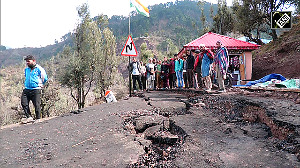'At the same time, if we are a little careless, we will run into trouble. No doubt about that.'

"The only way to prevent the disease from spending is keeping the infected person away from the population. And that's what we are doing right now," Dr R Sajith Kumar, professor and chief of the department of infectious diseases and head of medical education at the Kottayam Medical College, tells Rediff.com's Shobha Warrier.
How has India been tackling the coronavirus?
I must say so far, it has been a success. That is because we started acting right from the beginning when the first three cases were identified in Kerala. Our response was very good.
It was not like we started our efforts groping in the dark. We did everything systematically and in a structured manner trying to find the local clusters where the infected people might have accidentally gone.
You mean, in Kerala?
No, I am talking about India. The Government of India brought the stranded people from Wuhan in China, and then quarantined them.
We had all the information about the number of Indians in China, how many of them were coming and how many were staying back.
It was not like fighting an unknown enemy. We knew what we were doing. I would say it was a very structured and systematic effort that took place.
Here in Kerala, we had only a handful of infected people. But we were confident that nobody else in India would get the infection from anybody who came back from China.
You should see this as the most important positive point. Not a single person in India got infected from anybody during the China epidemic.
It changed only when the epidemic reached Europe.
In the China epidemic, the numbers were limited. And we exactly knew how many people were coming to India from China. And we had fixed points of entry.
Another most important thing was, most of those coming from China were youngsters who were otherwise healthy.
Also, those who were coming from China came as single individuals as most of them were students there. They did not come as family. So, it was easy to isolate them and contain the virus. We had no difficulty in keeping them away from their families for long periods too.
This was what happened during the Wuhan episode.
How different is the situation right now with Europe as the epicentre?
The situation is totally different with the epidemic in Europe and the Middle East.
There are two or three reasons for this. First, people are coming from so many areas. It is a convergence of so many routes and landing in so many places in India like Delhi, Mumbai, Hyderabad, Chennai, Kerala, Bangalore, etc.
And they are getting redistributed among the Indian population.
Is this going to be the biggest challenge and biggest risk for India?
Yes. Right now, if you look at the number, you will see that 99.9% of the infected people got infected when they were outside India.
This time, different strata of family members are affected because unlike those who came from China, those coming from Europe and the US are coming to join the families here. So, the first preference the moment they land at the airport, is go to their families.
And most of the time they are coming to meet the elderly people in their families back home. This is a big challenge for us. Our primary job right now is to prevent them from meeting elderly family members.
Look at the Ranni incident that happened in Kerala. The family who came here from Italy had a family reunion immediately after they landed. Then, they visited other relatives and also attended some family functions.
I would say our country is not responsible for what has happened so far. Any control measures you announce in India will have no impact when people come to India carrying the virus. Unless of course, you stop them from coming to India.
It is said that we have not had community spread so far. Do you expect that to happen soon?
I will tell you how the virus spreads.
Those coming with the virus will first infect those who are in close contact. That is not a community spread; just cluster spread. Like the family who came to Ranni infected other family members, which is the close cluster of people.
If another person or a group of people get infected from someone in this cluster, and then infects somebody else, we will reach a situation where we will not be able to trace the origin.
That's when community spread starts. Community spread happens when the cluster spread gets dispersed.
Our job right now is to prevent the clusters from dispersing.
Is it possible to prevent cluster spread from becoming community spread?
It is possible, that is what Kerala is doing right now.
For example, people from Ranni landed here on the 29th of February. Six people got infected from them in the first week of March. Now, we are in the third week of March. So far, not a single person who was in contact with one of these family members, has developed the disease.
Do you feel the rest of India should follow what Kerala has done?
Exactly.
Have other states been following this method?
From what the prime minister said, it appears that other states are following the same method as this is the only scientific method to prevent community spread.
What we have done is nothing out of the world; just a scientific and systematic approach to the problem.
Now, the 150-odd people who have come to the country with the virus, are staying in their own homes. If they infect their family members or the infected family members go out and infect somebody else, we may find it difficult to trace them.
That's why we are trying to track the route of the maximum number of people and keep them in the net so that we will come to know immediately when somebody develops the symptoms.
The only way to prevent the disease from spending is keeping the infected person away from the population. And that's what we are doing right now.
When thousands of people got infected in most of the other countries, India has 341 infections (as on March 22). Some people say it is because of the hot climate we have. Is there any scientific truth in it?
No. We do not have enough scientific information on whether environmental temperature has anything to do with this.
We see the Gulf countries also getting affected, and we can't say that the temperature is low in those countries. Their winter is over, and now the temperature is high.
You can't say that India is not getting affected; India is getting affected. And the time is only catching up with us, and we do not know whether the numbers will go up or not.
The difference is, other countries did not behave the way we have done so far.
In fact, even though we are telling people not to panic, we are sending panic messages, and this should keep the Indian population away from the infected people. In a way, this shouting out is good.
Today, except in the metropolitan cities, you don't see anyone outside on the streets. If you go to any place in Kerala right now, you will see that people are not coming out at all.
For a disease to affect people, you need three components. One is, the person should have the virus. Second is the transmissible range of the virus. And the third is the number of susceptible people who are coming into contact with the person with the virus.
This is the formula; AxBxC. Here A is constant; the number of people who are infected is constant right now. It is increasing only at a slow pace.
The transmissible range is fixed as far as the virus is concerned. It is not going to change and it is not changing.
So, the determinant of the formula AxBxC is the number of susceptible people who are going to get into contact with the person with the virus. That is where we are right now.
What has happened in many other countries is, for example in Europe or the US, the control of the government on the common man is much, much less than what we have here.
Here, the common man listens. We have a tendency to listen to or respect authority. We don't question them. This may be one of the good traits that Indians have.
This is exactly what helped China though whether you want to listen to authority or not, you are forced to listen there. And the authority was very powerful too. Here the authority is not powerful, but people are ready to listen.
Also, do you feel because the virus arrived in India much later, we were able to see how the other countries behaved and not repeat the mistakes they did?
There is no doubt about it. We now know how to face the disease.
If it had happened here in India first instead of in China, it would have been the end of it!
 Yes, we have been fortunate that way.
Yes, we have been fortunate that way.
But looking at what is happening in the European countries, the US and the UK, I feel they have not learnt the lessons from the China epidemic.
Also, Europe has a porous border. So, it is easy for the virus to spread.
If you take India, there are hundreds of villages in India where people don't need to mix with outsiders. While mixing happens very easily in Europe. That could be one of the reasons why it spread so fast throughout Europe.
Though there is no scientific proof to it, I think because Indians are exposed to so many viruses, we do not know whether immunity against one of those viruses is protecting us from the coronavirus. We do not know. It is a remote responsibility.
The world has seen many viruses before, like SARS, Ebola, H1N1, etc. But coronavirus has brought the world on its knees. What is so dangerous about this virus?
If the virus can kill somebody, it can survive only for a short time.
If the virus does not kill you, it can survive for a longer period.
About SARS, anybody who is infected with SARS lives only for a very small span of time. That was what happened with Nipah, and Ebola where the mortality rate was very high.
And when the mortality rate is so high, the number of people remaining with the virus comes down.
Similarly, nobody with HIV virus dies immediately; they live for 10 to 15 years.
It means, in such conditions, viruses survive in the human body for longer periods. When that happens, more and more people get infected from them.
The problem with coronavirus is that only the elderly is affected. So, if we have a system where the elderly alone is protected, we can prevent deaths and infections a lot.
That's why in the guidelines to be followed, the government has asked people above 65 to be quarantined even if they are not infected. This will prevent the vulnerable population from getting exposed to the virus.
If nobody dies of the coronavirus, nobody will be bothered about the virus. See, we have the common cold, flu, respiratory viruses and hundreds and thousands of people get infected. But nobody dies of these viruses.
Our problem is the elderly and people with existing illnesses. So, our target should be to see that these people do not get infected.
How is the war against covid-19 different from fighting other viruses like Nipah, HIV, etc?
In the case of HIV, we had a similar situation till ART became available. With HIV treatment available, things are totally different.
In the case of covid-19, a majority of people who are suffering from the infection are recovering without any problem.
We are not worried about the number of youngsters getting infected with coronavirus because they will have a spontaneous recovery. Their mortality is 1 in 1,000 which is much less than, say, road accidents. More young people die from road accidents than due to coronavirus infection.
We are only worried about the young people giving the infection to those around them, and they include the elderly and the diabetics. So, we want to prevent that from happening./p>
By now, we know what is going to happen tomorrow. The whole picture is clear to us. That is why India is likely to succeed in this war.
Does India having around 50% of its population below the age of 35 also helping?
Yes. Unlike European countries, a majority of our population is young. Maybe that's why India has a bigger chance to succeed against covid-19. We cannot say anything with certainly unless we prove it scientifically.
India may not succumb like other countries. At the same time, if we are a little careless, we will run into trouble. No doubt about that.
Should India be worried right now?
Yes. If you are not worried, you will not be careful. Like any country in the world has to be worried, India also has to be worried. If you are careless, there will be problems.
Are the next two weeks crucial?
Yes, the next two weeks are crucial. Because if we go to the next stage, then it will be a stage of no return. That is what happened to Italy and the whole of Europe.
We don't want to go to that stage. Controlling 150 people who came to India is not difficult, but controlling even 50,000 people is very difficult and impossible.
China not reporting many new cases, is it good news for the rest of the world?
That will happen with all epidemics. After some time, the number of susceptible population will come down, that is when a good number of them either die or recover.
There is nothing unusual in China not reporting any new cases. It is something we have expected. The earlier you reach that, the more comfortable you are.
As an expert on infectious diseases, how long do you think this will last?
It is difficult to say. Every epidemic has got a trajectory; it goes up to a significant level and then comes down.
The only corollary I can think of is H1N1. It is still there in the community, but the big panic about it is over now.
When people get H1N1, they are not dying in large numbers. Because we know how to handle the situation.
So, I feel covid-19 might linger on for many more months at a smaller pace. Or, it can become catastrophic. It is practically unpredictable now.
Some people compare this to the 1918 Spanish flu...
We are worried whether we will go to that situation. It is a real worry for the entire world.











 © 2025
© 2025